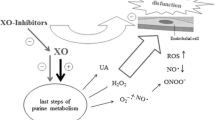Abstract
Background
The present study aimed to clarify the beneficial effect of allopurinol on cardiovascular morbidity and mortality in a cohort of hypertensive nephropathy patients with impaired kidney function.
Methods
One hundred and seventy-eight patients diagnosed with hypertensive nephropathy and presenting with impaired kidney function (estimated glomerular filtration rate <45 mL/min/1.73 m2) were recruited from nephrology clinics. Oral allopurinol was prescribed in 67 of these patients. The effects of allopurinol use on the development of cardiovascular disease (i.e. ischemic heart disease, congestive heart failure, and stroke) and all-cause death was analyzed using the Cox proportional hazard model.
Results
During the follow-up of 18.4 months (mean), 28 primary events occurred. Basal use of allopurinol was a significant beneficial factor (hazard ratio = 0.342, p = 0.0434, standard error = 0.53058) after adjusting for confounding factors.
Conclusion
The use of allopurinol in hypertensive subjects with impaired kidney function appears to be beneficial in preventing cardiovascular morbidity and all-cause mortality, indicating that this xanthine oxidase inhibitor protects the vascular system, at least in this specific group.

Similar content being viewed by others
References
Go AS, Chertow GM, Fan D, McCulloch CE, Hsu CY. Chronic kidney disease and the risks of death, cardiovascular events, and hospitalization. N Engl J Med. 2004;351:1296–305.
Ninomiya T, Kiyohara Y, Kubo M, Tanizaki Y, Doi Y, Okubo K, et al. Chronic kidney disease and cardiovascular disease in a general Japanese population: the Hisayama Study. Kidney Int. 2005;68:228–36.
Nakayama M, Metoki H, Terawaki H, Ohkubo T, Kikuya M, Sato T, et al. Kidney dysfunction as a risk factor for first symptomatic stroke events in a general Japanese population—the Ohasama study. Nephrol Dial Transplant. 2007;22:1910–5.
Klag MJ, Whelton PK, Randall BL, Neaton JD, Brancati FL, Ford CE, et al. Blood pressure and end-stage renal disease in men. N Engl J Med. 1996;334:13–8.
Nakayama M, Sato T, Sato H, Yamaguchi Y, Obara K, Kurihara I, et al. Different clinical outcomes for cardiovascular events and mortality in chronic kidney disease according to underlying renal disease: the Gonryo study. Clin Exp Nephrol. 2010;14:333–9.
Nakayama M, Sato T, Miyazaki M, Matsushima M, Sato H, Taguma Y, et al. Increased risk of cardiovascular events and mortality among non-diabetic chronic kidney disease patients with hypertensive nephropathy: the Gonryo study. Hypertens Res. 2011;34:1106–10.
Noman A, Ang DSC, Ogston S, Lang CC, Struthers AD. Effect of high-dose allopurinol on exercise in patients with chronic stable angina: a randomized, placebo controlled crossover trial. Lancet. 2010;375:2161–7.
Goicoechea M, de Vinuesa SG, Verdalles U, Ruiz-Caro C, Ampuero J, Rincón A, et al. Effect of allopurinol in chronic kidney disease progression and cardiovascular risk. Clin J Am Soc Nephrol. 2010;5:1388–93.
National Institue of Neurological Disorders and Stroke Ad Hoc Committee. Classification of cerebrovascular disease. Stroke. 1990;21:637–76.
Matsuo S, Imai E, Horio M, Yasuda Y, Tomita K, Nitta K, et al. Collaborators developing the Japanese equation for estimated GFR. Revised equations for estimated GFR from serum creatinine in Japan. Am J Kidney Dis. 2009;53:982–92.
Takahashi M, Fukuda Y, Iwata S. Fundamental evaluation and efficacy for protein to creatinine ratio by ATLAS kit cartridge PRO12 using automatic urine analyzer Clinitek ATLAS XL. Igaku To Yakugaku 2002; 48:727–735 (in Japanese).
George J, Carr E, Davies J, Belch JJ, Struthers A. High-dose allopurinol improves endothelial function by profoundly reducing vascular oxidative stress and not by lowering uric acid. Circulation. 2006;114:2508–16.
Terawaki H, Yoshimura K, Hasegawa T, Matsuyama Y, Negawa T, Yamada K, et al. Oxidative stress is enhanced in correlation with renal dysfunction: examination with the redox state of albumin. Kidney Int. 2004;66:1988–93.
Terawaki H, Takada Y, Era S, Funakoshi Y, Nakayama K, Nakayama M, et al. The redox state of albumin and serious cardiovascular incidence in hemodialysis patients. Ther Apher Dial. 2010;14:465–71.
Terawaki H, Matsuyama Y, Matsuo N, Ogura M, Mitome J, Hamaguchi A, et al. A lower level of reduced albumin induces serious cardiovascular incidence among peritoneal dialysis patients. Clin Exp Nephrol. 2012. doi:10.1007/s10157-012-0610-x.
Krishnan E. Hyperuricemia and incident heart failure. Circ Heart Fail. 2009;2:556–62.
Bos MJ, Koudstaal PJ, Hofman A, Witteman JC, Breteler MM. Uric acid is a risk factor for myocardial infarction and stroke: the Rotterdam study. Stroke. 2006;37:1503–7.
Hozawa A, Folsom AR, Ibrahim H, Javier Nieto F, Rosamond WD, Shahar E. Serum uric acid and risk of ischemic stroke: the ARIC Study. Atherosclerosis 2006; 187:401–407.
Krishnan E, Baker JF, Furst DE, Schumacher HR. Gout and the risk of acute myocardial infarction. Arthritis Rheum. 2006;54:2688–96.
Kim SY, Guevara JP, Kim KM, Choi HK, Heitjan DF, Albert DA. Hyperuricemia and risk of stroke: a systematic review and meta-analysis. Arthritis Rheum. 2009;61:885–92.
Simmonds HA, Cameron JS, Morris GS, Davies PM. Allopurinol in renal failure and the tumour lysis syndrome. Clin Chim Acta. 1986;160:189–95.
Kenneth R, Noone RM, Stone WJ. Severe allopurinol toxicity. Am J Med. 1984;76:47–56.
Terawaki H, Suzuki T, Yoshimura K, Hasegawa T, Takase H, Nemoto T, et al. A case of allopurinol-induced muscular damage in a chronic renal failure patient. Nihon Jinzo Gakkai Shi. 2002; 44:50–53 (in Japanese).
Saji M. A study of serum oxipurinol concentration and renal function in patients administered allopurinol. Nihon Jinzo Gakkai Shi 1996; 38:640–650 (in Japanese).
Acknowledgments
This study was supported by a Grant from Astellas Pharm Inc. The authors express their special thanks to Ms. Makiko Nakayama for her assistance.
Conflict of interest
The authors have no conflicts of interest to declare.
Author information
Authors and Affiliations
Corresponding author
About this article
Cite this article
Terawaki, H., Nakayama, M., Miyazawa, E. et al. Effect of allopurinol on cardiovascular incidence among hypertensive nephropathy patients: the Gonryo study. Clin Exp Nephrol 17, 549–553 (2013). https://doi.org/10.1007/s10157-012-0742-z
Received:
Accepted:
Published:
Issue Date:
DOI: https://doi.org/10.1007/s10157-012-0742-z




